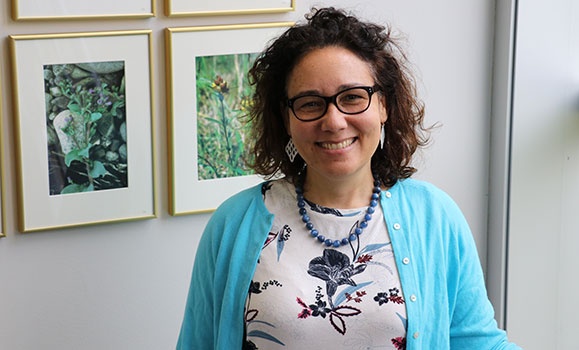News
» Go to news mainKillam Postdoctoral Fellow's research tackles climate change

When Lisa Benjamin taught her first Environmental Law II course on climate change law to Schulich School of Law upper-year students in January, the first thing she did was show a Yale Climate Connections video illustrating the emotions of climate change, among them shame, anger, and fear.
“Climate change illicits intense emotions, even at the academic level,” says Benjamin. “My aim was that the students would be able to acknowledge these emotions, then move forward with the information presented to them and use that information to be active in the future, with either small personal commitments to environmental responsibility or in their legal practice.”
Benjamin will soon complete her six-month term as a Schulich Law Killam Postdoctoral Fellow before joining the faculty at Lewis & Clark Law School in Portland, Oregon, in September. There, she’ll teach Energy Law, International Climate Change Law, and Environmental Justice.
I wanted to give my students the tools to understand the technicalities and the ability to think through the very intense emotions that everyone feels about climate change, particularly young people. — Lisa Benjamin
The globally recognized expert and scholar in energy, climate change, and corporate law—particularly as they intersect—hails from The Bahamas. She earned her LLB from the University College London, her LLM from the University of London, and her PhD from the University of Leicester, England.
“During my LLM, I took an environmental law course that covered climate change, and I realized that it was a huge issue for The Bahamas,” she says. After practicing corporate law in London, she returned home in 2008. “I started to teach environmental law at the University of The Bahamas, and my interest in it grew. I ended up combining my corporate law experience with climate change law.”
One of the first in her field
At the time, Benjamin was the only environmental law academic in The Bahamas, and one of just three practicing environmental lawyers. After completing a postdoctoral fellowship at the Blavatnik School of Government at Oxford University, she was keen to continue her research through another fellowship which combined her interests in both climate change and corporate law. She had read Schulich Law Professor Meinhard Doelle’s work and had been in touch with Professor Sara Seck through Canada’s Centre for International Governance Innovation (CIGI).
“Both »ĆÉ«Ö±˛Ą and the Schulich School of Law have an excellent reputation in The Bahamas,” says Benjamin. “Meinhard and Sara were really responsive to my research proposal and fellowship application. The combination of their reputation and friendliness is what drew me here.”
During her time at Schulich Law, in addition to teaching Environmental Law II, Benjamin’s major research project has been rewriting her PhD into book form, which Cambridge University Press plans to publish next year. With Seck, she is co-authoring a chapter on corporations and climate litigation in Canada for a book coming out through CIGI.
It has been tremendously valuable having Lisa here to further research collaborations on crucial issues of business responsibilities for climate change. — Professor Sara Seck
“It has been tremendously valuable having Lisa here with us for six months to further research collaborations on crucial issues of business responsibilities for climate change,” says Seck. “She is one of a very small number of researchers globally who have the necessary expertise and commitment.”
Other projects she is working on include edits to a paper for the Utah Law Review titled “The Road to Paris Runs Through Delaware: Climate Litigation and Directors’ Duties” and a chapter on corporations, corporate social responsibility, and carbon majors for a book that Doelle and Seck are editing.
“It has been interesting to look at Canadian advances in climate change, and I like the mix of teaching and research,” says Benjamin. “I wanted to give my students the tools to understand the technicalities and the ability to think through the very intense emotions that everyone feels about climate change, particularly young people. One of my students said that she was terrified about climate change at the beginning of the course.”
Because the fellowship has limited teaching, Benjamin has been able to focus on her research with the guidance of her mentors. “It has been academically satisfying and thought-provoking to talk to Meinhard and Sara. After I leave I’ll be able to keep in touch, ask them questions, and have them review my articles. Learning from, and building relationships with, other academics in your field is really important, particularly for junior academics.”
Recent News
- Professor Emeritus Wayne MacKay ft in "Alcohol regulator rings alarm bell on overserving in N.S. bars"
- 2024 Smith Shield Moot Results
- Meet Loveth Ovedje, Class of 2024
- Emilie Coyle Receives Inaugural Emerging Leader Impact Award
- Associate Professor Jodi Lazare ft in "Senators told biosecurity bill is really about trespassing"
- Schulich School of Law – 2024 Faculty Appointments
- Robert J. Currie Named Viscount Bennett Professor of Law
- Professor Matthew Herder ft in "Pharmacare bill would see medications paid for, administered through public plan, Holland writes in letter"
